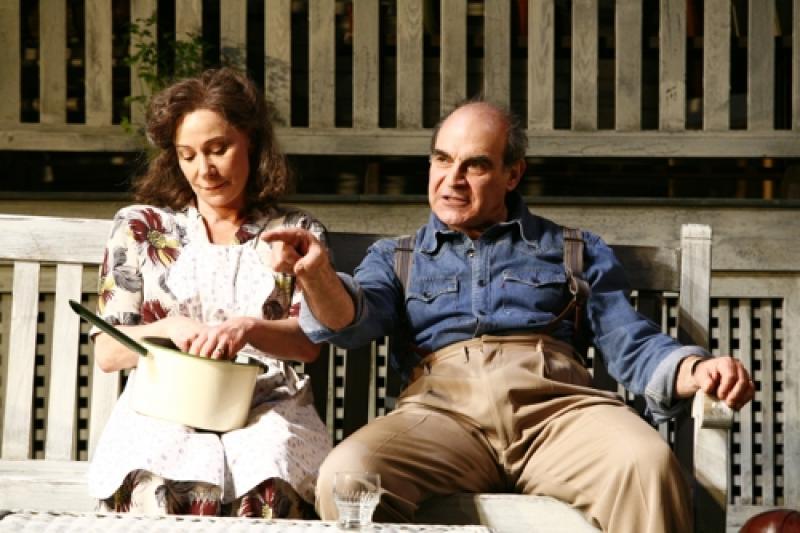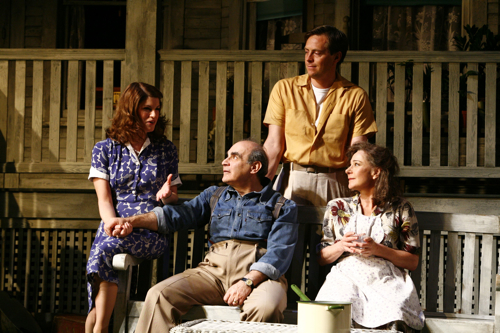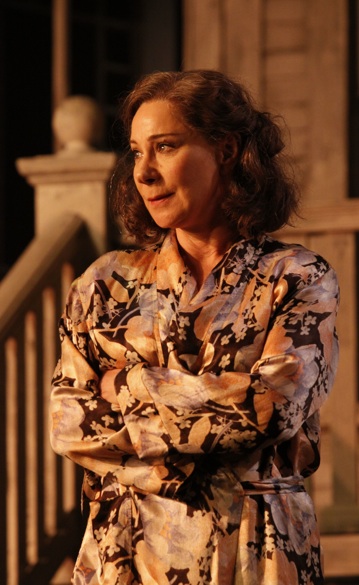All My Sons, Apollo Theatre | reviews, news & interviews
All My Sons, Apollo Theatre
All My Sons, Apollo Theatre
Zoe Wanamaker touches the heart in a moral fable about the sickness of self-deception

A young Arthur Miller wrote this highly moralistic, redemption-seeking play soon after the Second World War, a parable about an older generation’s dubious pragmatic principles versus the bewildered idealism of their children who were Miller’s generation, the soldiers’ generation.
If I find Miller's effects over-calculated, they were not so for the fairly young first-night audience last night who stood in ovation and will ensure a second big hit run for this production. Maybe that’s a deathless message of its own.
 Starting gently in the garden of a picturesque wooden American country house with tea on the table and grass underfoot, designer William Dudley and lightsman Mark Henderson lay out a serene domestic scene just waiting for bombs to drop into it. Miller started All My Sons in the war and spent more than two years on it, after failing with his first play, and it feels like it, every strand wound super-carefully into position, every character cut to fit the jigsaw. The father-figure, Joe Keller, made plane parts for the US Airforce in his factory in the war, but his partner was on duty the day the factory sent out a batch of cylinder heads known to be faulty - and 21 pilots were killed in the consequent crashes. The partner went to jail, Keller was exonerated, but the fact that the community still finds him suspect - despite his commendable business success - is allowed to hang like a crack in the ceiling dripping blood on everything he has.
Starting gently in the garden of a picturesque wooden American country house with tea on the table and grass underfoot, designer William Dudley and lightsman Mark Henderson lay out a serene domestic scene just waiting for bombs to drop into it. Miller started All My Sons in the war and spent more than two years on it, after failing with his first play, and it feels like it, every strand wound super-carefully into position, every character cut to fit the jigsaw. The father-figure, Joe Keller, made plane parts for the US Airforce in his factory in the war, but his partner was on duty the day the factory sent out a batch of cylinder heads known to be faulty - and 21 pilots were killed in the consequent crashes. The partner went to jail, Keller was exonerated, but the fact that the community still finds him suspect - despite his commendable business success - is allowed to hang like a crack in the ceiling dripping blood on everything he has.
Keller had two sons, but one went missing three years earlier - his mother refuses to think he is dead, and when her younger son Chris wants to marry his brother’s girlfriend, who has accepted that Larry is dead, she wants to throw them both out. The girlfriend is the daughter of the jailed partner, and hence the guilt of the father is visited upon her just as much as it lies upon Chris. By the end of the play the kids will tell truths and think they are doing right; the older ones will be made to expose their self-deceptions and face consequences.
 Davies swathes this sternly delineated tragedy-in-waiting with naturalism. The first half has a jocular atmosphere, as neighbours fluff up the edges with drawing-room comedy lines, but we are led to see that the mother is now physically ill with her loss. In Zoë Wanamaker’s extraordinary, edgy, complex performance Kate Keller is a real worried Jewish mama with her pepper-and-salt curls, her apron and her concern that people eat more. Wanamaker somehow suggests the presence of the Holocaust in her mental make-up, a backstory of cousins, perhaps, family who stayed behind in Europe when she and her parents long ago emigrated to the US. Kate is the best-drawn character, a good, scared woman who is sure that safety in life is about clinging on to pretences and not examining guilt too much. By believing that her elder son, a pilot, is only missing, she also contrives to deny to herself the instincts she’s burying about her husband, because only by that piece of pretence can her family stability, the business, the house, security, order, survive.
Davies swathes this sternly delineated tragedy-in-waiting with naturalism. The first half has a jocular atmosphere, as neighbours fluff up the edges with drawing-room comedy lines, but we are led to see that the mother is now physically ill with her loss. In Zoë Wanamaker’s extraordinary, edgy, complex performance Kate Keller is a real worried Jewish mama with her pepper-and-salt curls, her apron and her concern that people eat more. Wanamaker somehow suggests the presence of the Holocaust in her mental make-up, a backstory of cousins, perhaps, family who stayed behind in Europe when she and her parents long ago emigrated to the US. Kate is the best-drawn character, a good, scared woman who is sure that safety in life is about clinging on to pretences and not examining guilt too much. By believing that her elder son, a pilot, is only missing, she also contrives to deny to herself the instincts she’s burying about her husband, because only by that piece of pretence can her family stability, the business, the house, security, order, survive.
It’s a practical solution for her, and one that her younger son Chris will condemn in an impassioned speech aimed at his father, and his father’s generation, for being “practical”. For Chris, “practical” means morally evasive, as in capitalism-at-any-cost. The speech is true to his age, and probably indeed that era of the late Forties, and Stephen Campbell Moore plays him as soft-faced, shy and awkward, and so the speech fits that too. However what doesn’t fit is the jarring line about his character that Miller plants like a nettle in the border, where his mother says at one point that “they say in the war Chris was supposed to be a killer, here he’s afraid of mice”. This is one of several lines that feel planted in the text, and I give Davies every credit for trying to ignore a few of them in the interests of saving Miller from his own overcomplications.
Welcome echoes of Suchet’s TV performance as Robert Maxwell hang about his Joe Keller: the affable smile that suddenly turns flinty, and the way his soft round little body can crumple like a brown paper bag one moment and freeze in watchful attention the next. His American accent wanders, and an East European tang would help, because there is something of the long-distance animal survivor about how he looks, and his excuses for his behaviour - “I’m in business... I’m a man... I did it for you...” and his repeated blaming of “them” and “they”. There are and were many righteous parents blaming their children for their own bad decisions (and indeed political leaders blaming their subordinates for faulty army supplies), but Suchet isn’t one of the Gambons of this world and doesn’t quite carry off the contemptibility of this particular one.
It's not all his fault, though. All My Sons drives its points forcibly but it is a formulaic equation, a moral fable that wants to sort us out, rather than a genuinely curious study of character. Every praise is due to Wanamaker for her subtlety, and to the touching and intelligent playing of the girlfriend Annie by Jemima Rooper. Still, for all their spontaneity and all Davies's directorial warmth, to me this remains a master-class in dramatic devices rather than a dramatic masterpiece.
The future of Arts Journalism
You can stop theartsdesk.com closing!
We urgently need financing to survive. Our fundraising drive has thus far raised £49,000 but we need to reach £100,000 or we will be forced to close. Please contribute here: https://gofund.me/c3f6033d
And if you can forward this information to anyone who might assist, we’d be grateful.

Subscribe to theartsdesk.com
Thank you for continuing to read our work on theartsdesk.com. For unlimited access to every article in its entirety, including our archive of more than 15,000 pieces, we're asking for £5 per month or £40 per year. We feel it's a very good deal, and hope you do too.
To take a subscription now simply click here.
And if you're looking for that extra gift for a friend or family member, why not treat them to a theartsdesk.com gift subscription?
more Theatre
 Othello, Theatre Royal, Haymarket review - a surprising mix of stateliness and ironic humour
David Harewood and Toby Jones at odds
Othello, Theatre Royal, Haymarket review - a surprising mix of stateliness and ironic humour
David Harewood and Toby Jones at odds
 Macbeth, RSC, Stratford review - Glaswegian gangs and ghoulies prove gripping
Sam Heughan's Macbeth cannot quite find a home in a mobster pub
Macbeth, RSC, Stratford review - Glaswegian gangs and ghoulies prove gripping
Sam Heughan's Macbeth cannot quite find a home in a mobster pub
 The Line of Beauty, Almeida Theatre review - the 80s revisited in theatrically ravishing form
Alan Hollinghurst novel is cunningly filleted, very finely acted
The Line of Beauty, Almeida Theatre review - the 80s revisited in theatrically ravishing form
Alan Hollinghurst novel is cunningly filleted, very finely acted
 Wendy & Peter Pan, Barbican Theatre review - mixed bag of panto and comic play, turned up to 11
The RSC adaptation is aimed at children, though all will thrill to its spectacle
Wendy & Peter Pan, Barbican Theatre review - mixed bag of panto and comic play, turned up to 11
The RSC adaptation is aimed at children, though all will thrill to its spectacle
 Hedda, Orange Tree Theatre review - a monument reimagined, perhaps even improved
Scandinavian masterpiece transplanted into a London reeling from the ravages of war
Hedda, Orange Tree Theatre review - a monument reimagined, perhaps even improved
Scandinavian masterpiece transplanted into a London reeling from the ravages of war
 The Assembled Parties, Hampstead review - a rarity, a well-made play delivered straight
Witty but poignant tribute to the strength of family ties as all around disintegrates
The Assembled Parties, Hampstead review - a rarity, a well-made play delivered straight
Witty but poignant tribute to the strength of family ties as all around disintegrates
 Mary Page Marlowe, Old Vic review - a starry portrait of a splintered life
Tracy Letts's Off Broadway play makes a shimmeringly powerful London debut
Mary Page Marlowe, Old Vic review - a starry portrait of a splintered life
Tracy Letts's Off Broadway play makes a shimmeringly powerful London debut
 Little Brother, Soho Theatre review - light, bright but emotionally true
This Verity Bargate Award-winning dramedy is entertaining as well as thought provoking
Little Brother, Soho Theatre review - light, bright but emotionally true
This Verity Bargate Award-winning dramedy is entertaining as well as thought provoking
 The Unbelievers, Royal Court Theatre - grimly compelling, powerfully performed
Nick Payne's new play is amongst his best
The Unbelievers, Royal Court Theatre - grimly compelling, powerfully performed
Nick Payne's new play is amongst his best
 The Maids, Donmar Warehouse review - vibrant cast lost in a spectacular-looking fever dream
Kip Williams revises Genet, with little gained in the update except eye-popping visuals
The Maids, Donmar Warehouse review - vibrant cast lost in a spectacular-looking fever dream
Kip Williams revises Genet, with little gained in the update except eye-popping visuals
 Ragdoll, Jermyn Street Theatre review - compelling and emotionally truthful
Katherine Moar returns with a Patty Hearst-inspired follow up to her debut hit 'Farm Hall'
Ragdoll, Jermyn Street Theatre review - compelling and emotionally truthful
Katherine Moar returns with a Patty Hearst-inspired follow up to her debut hit 'Farm Hall'
 Troilus and Cressida, Globe Theatre review - a 'problem play' with added problems
Raucous and carnivalesque, but also ugly and incomprehensible
Troilus and Cressida, Globe Theatre review - a 'problem play' with added problems
Raucous and carnivalesque, but also ugly and incomprehensible

Add comment